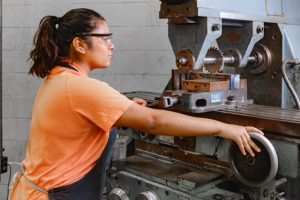(RED OAK, Texas) – Texas State Technical College’s Precision Machining Technology program teaches students the skills they need to walk into any company that hires precision machinists and begin work.
“If it’s man-made, we (machinists) made some or all of it in the process of its production,” said Darren Block, statewide lead instructor for TSTC’s Precision Machining Technology program.
Texas had more than 28,500 machinists in May 2019 making an annual mean wage of $46,420, according to the U.S. Bureau of Labor Statistics.
TSTC’s Precision Machining Technology program teaches students the skills to operate grinders, metal lathes and milling machines. Students work on both manual and computer numerical controlled machines and design parts using SolidWorks.
“Precision Machining Technology is a small but growing problem at TSTC in North Texas,” said Marcus Balch, the campus provost. “Many industry partners desire these graduates, and like most of the campuses, we just do not have enough graduates to go around.”
North Texas has a big need for people with precision machining skills.
There were more than 1,300 job postings for the machining field in Workforce Solutions of North Central Texas’ 16-county service area from September 2020 to February 2021. These machining-type jobs include CNC machine tool operators for metals and plastics, industrial engineering technicians, and structural metal fabricators and fitters.
Kyle Kinateder, president and chief executive officer of Midlothian Economic Development Corp., said the need for machinists is being seen more from business prospects inquiring about the city than those that are already established. He said companies eager to come to the city are looking at the basic pool of available workers.
“That is really why TSTC is so important,” Kinateder said. “They can come in and provide these skills within our communities, and the companies can come in with a minimal amount of investment and customize their skills to their equipment.”
He said the skills that machinists have are applicable to running many kinds of equipment.
“We continue to see manufacturing relocate from overseas to the United States,” Kinateder said. “The only way those companies are doing this to be successful is by relying on technology and relying on automation, and at the heart of all those are machine operators.”
The federal labor statistics agency has estimated there will be a need for more than 404,000 machinists by 2029. This is attributed to the development of autoloaders, CNC machines and high-speed machines.
Balch said the campus is partnering with a local school district to provide dual enrollment classes to train more students to work in the field.
TSTC in North Texas offers an Associate of Applied Science degree in Precision Machining Technology and a machining certificate.
Registration continues for the summer and fall semesters at TSTC. For more information, go to tstc.edu.
